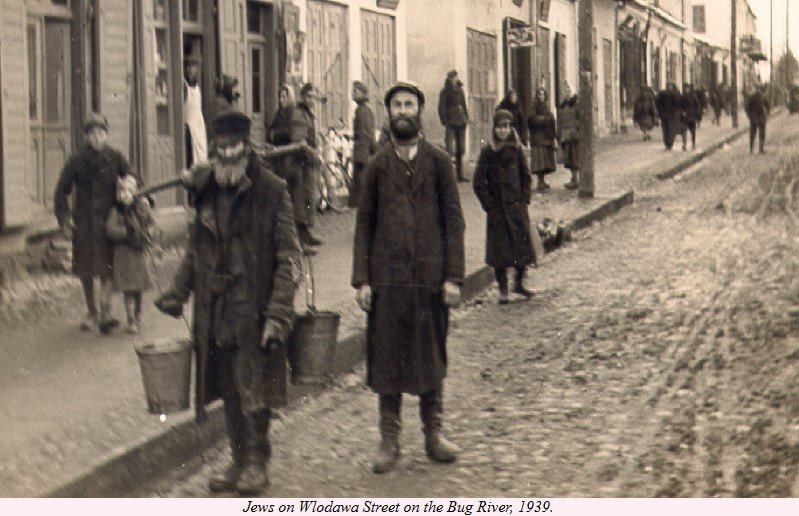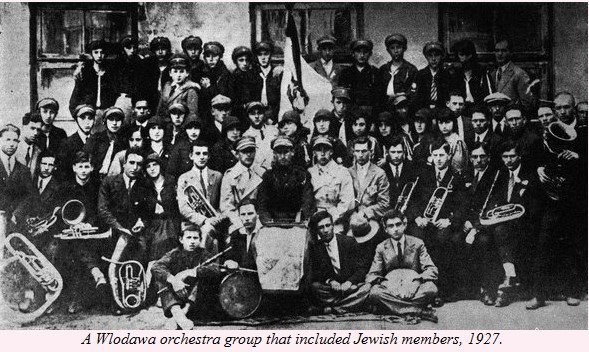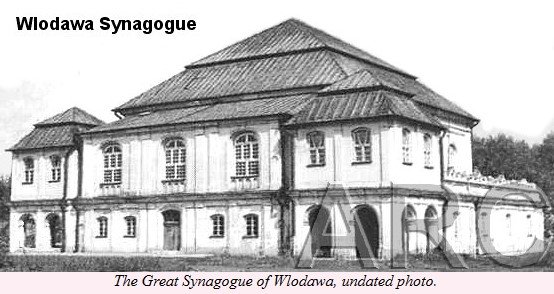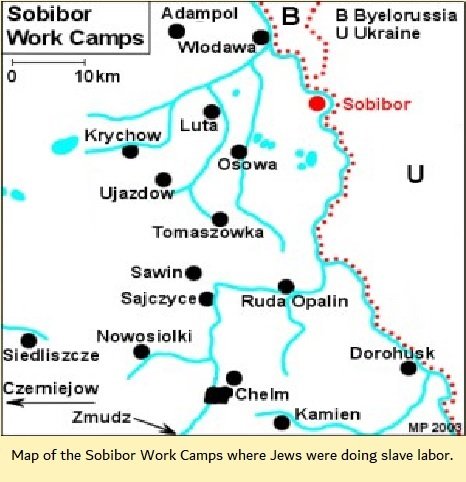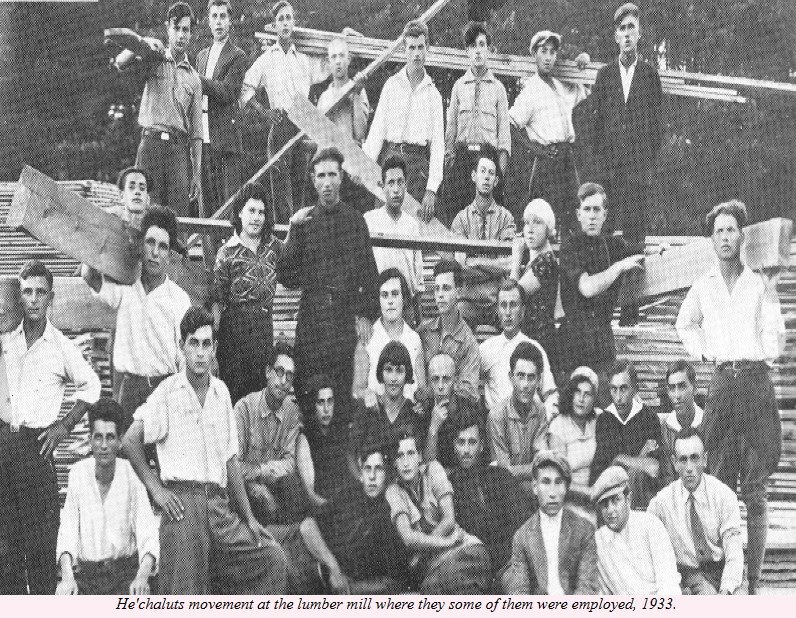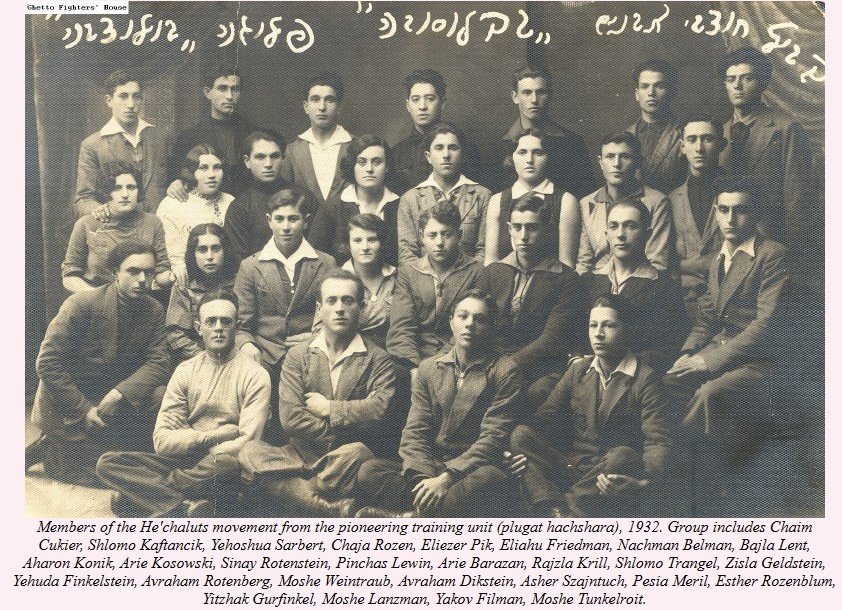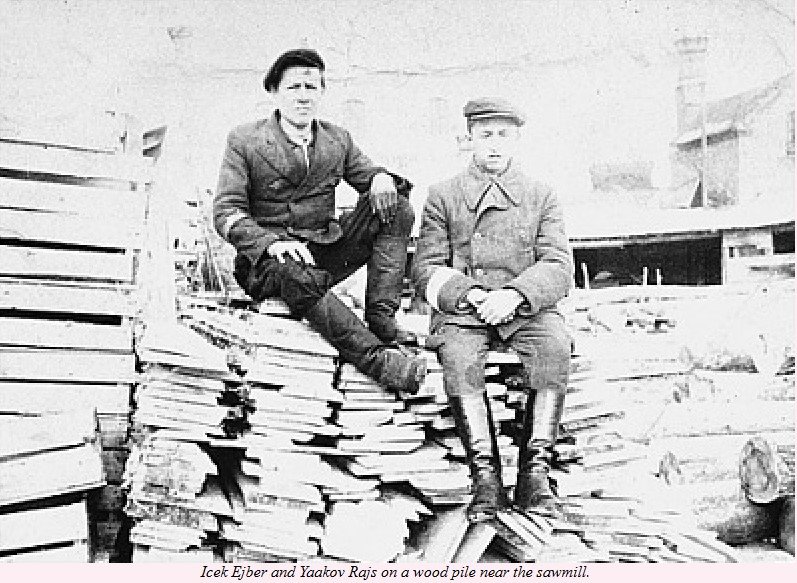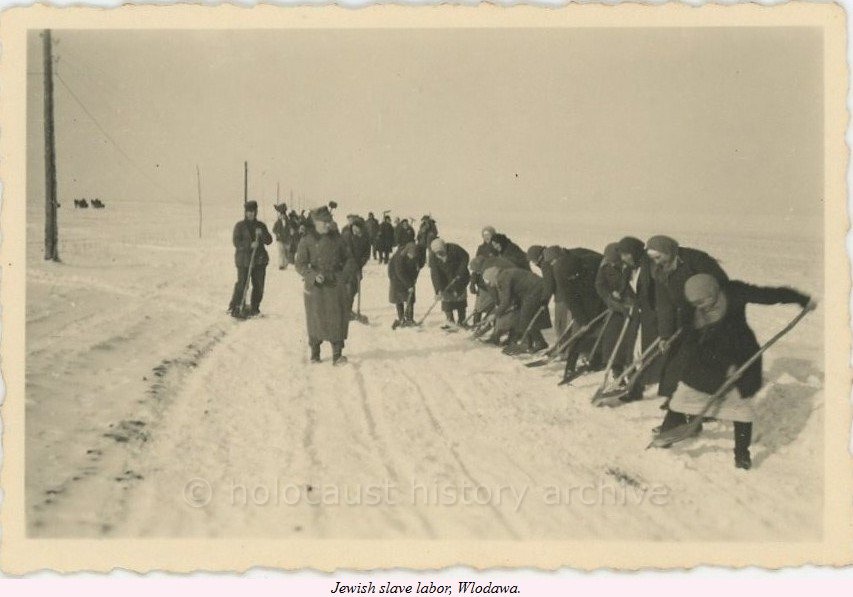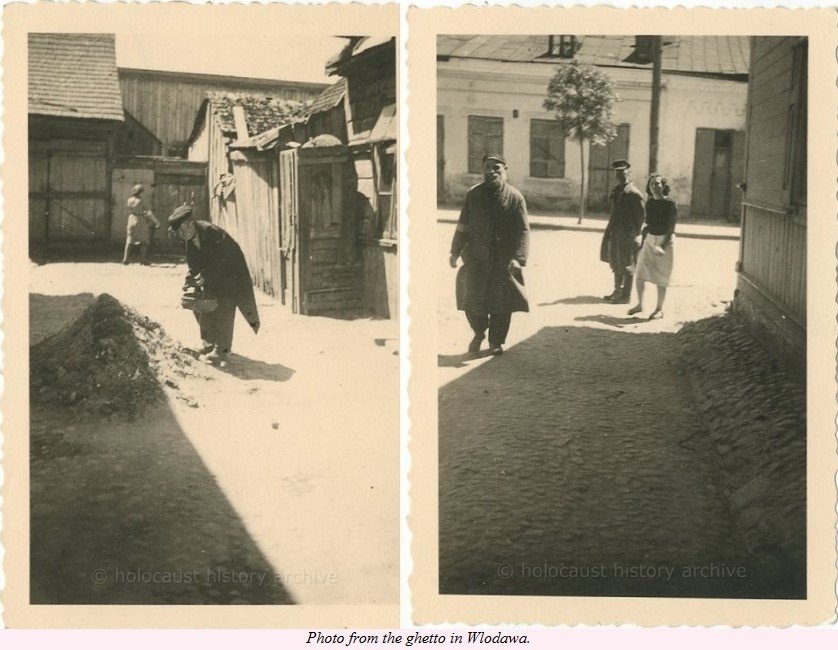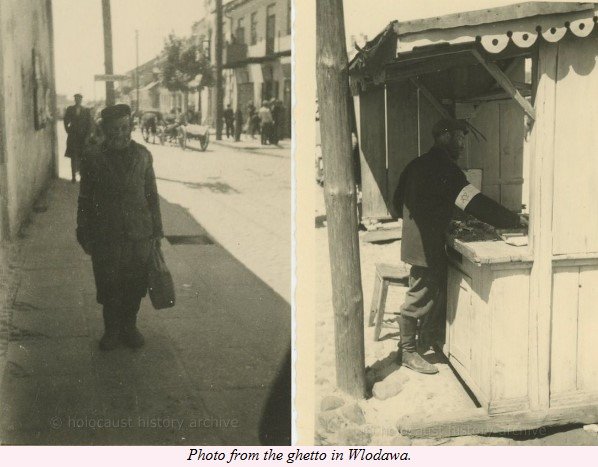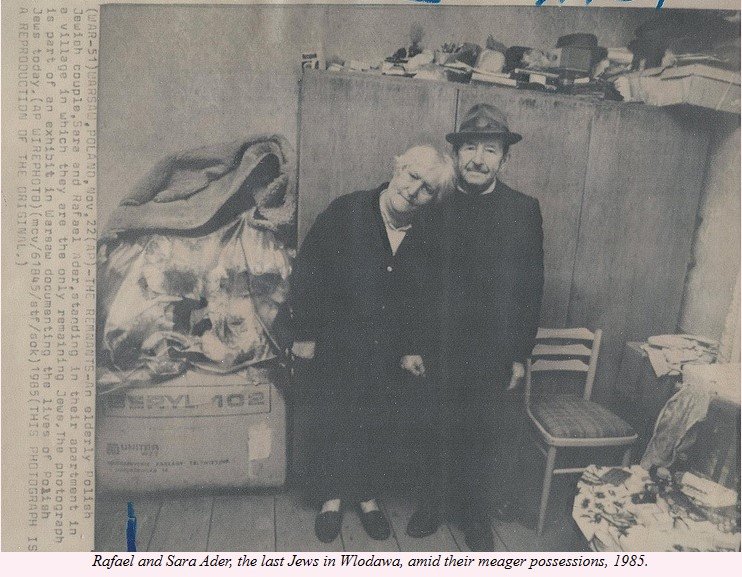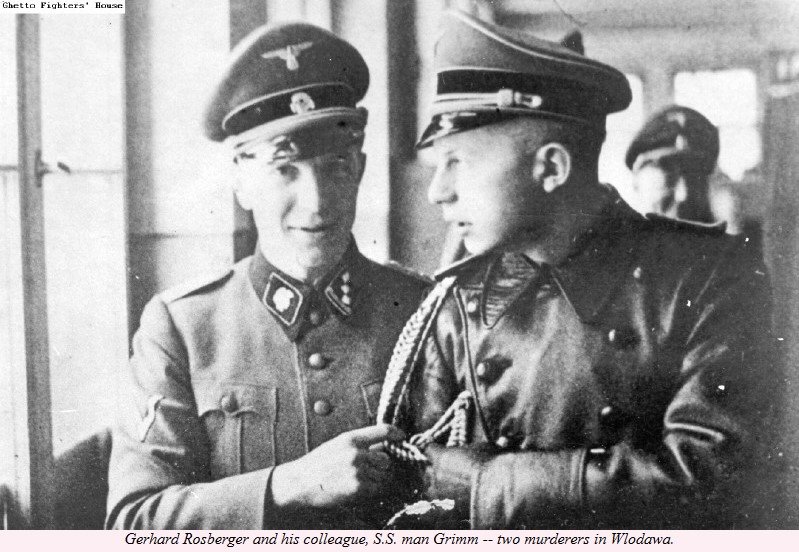Remember Jewish Wlodawa
Pronunciation: Vlow-dava
HISTORY OF JEWISH WLODAWA
Wlodawa is located on the Bug River, close to the borders with Belarus and Ukraine. Prior to WWII, 60 to 70 percent of the town was Jewish. The town population is currently around 15,000.
The existence of a Jewish community in Wlodawa is first recorded in connection with the Lublin fair of 1531. By 1623 Wlodawa had a representative in the Council of the Four Lands. The community was devastated by the Chmielnicki massacres of 1648, but afterwards re-established and rebuilt. By 1765 the town had 630 Jews. In 1693, the town had 197 dwellings, 89 of which were owned by Jewish families. The census of 1773 records Jewish physicians, butchers, millers, barbers, goldsmiths, tailors, furriers, merchants, and carters. Additionally, there was one Jewish person in the following trades: coppersmith, cobbler, glazier, chandler, and wheelwright. There were also 8 schoolmasters, 2 educators, a cantor, a bass player, and a cymbal player. There were 2,236 Jews in 1827 and 6,706 Jews in 1907.
The first synagogue was built in the late 17th century. In the period between 1764 and 1774, a new brick synagogue one was erected. At the end of the 18th century the ideas of the Chasidic movement reached the town. A tzaddik named Ohrele Karlinski gained notoriety in Wlodawa and its vicinity. In 1820, out of 3,298 town inhabitants, 60% were Jewish. When Wlodawa came under the rule of Russia (1832-1862), due to the border line character of the town, the tzarist authorities introduced a ban on Jewish settlement in the town. Yet by 1857 there were 4,304 Jews residing in town out 9,293 inhabitants. Before the outbreak of World War II Wlodawa was inhabited by 5,650 Jews who constituted 61% of whole.
In the late 19th century, Wlodawa had a Jewish-owned steam-powered flour mill, tannery and soap factory. Wlodawa's first Zionist organization was formed in 1898. The town also had Bund, Agudath Israel, and Poalei Zion organizations. There was also a Jewish school for girls called Beis Yaakov. The Jewish quarter in town consisted of the following streets: ul. Wyrkowska (now ul. Tysiaclecia Panstwa Polskiego), ul. Solna (now ul. Czerwonego Krzyza), ul. Okuninska, ul. Furmanska, ul. Kozia (now ul. Witosa) and ul. Chelmska. Wlodawa had 3 synagogues, the Great Synagogue at 7 Czerwonego Krzyza Street, the small synagogue next door at 5 Czerwonego Krzyza Street, and the Hasidic synagogue at Pilsudskiego Street. There were also four houses of prayer, a kahal house, a Talmud Torah, and a ritual bath. The Talmud Torah school was run by A. W. Truchanawski (principal) and the teachers were H. Gutnicki, Z. Epelbaum and G. Lewitan. Prayer houses were operated by Ryfka Szygiel (or Szyzgiel), Szija Czernogora (sp?), Majer Fiszman and Jerzy Feldman. The Wlodawa cemetery was situated between what is now ul. Jana Pawla II and ul. Reymonta. Gravestones from the local cemetery were removed by the Nazis and used for paving the streets and building embankments on the River Wlodawa (which flows into the Bug). The Jewish cemetery was demolished by the Nazis. They used the synagogue buildings for military storage. The handsome, Baroque-style Wlodawa synagogue is now a tourist attraction.
NEARBY JEWISH COMMUNITIES
There were nearby communities that also had pre-war Jewish populations, including: Adampol (unknown number of Jews), Cokolowka (unknown number of Jews), Dubeczno (400-650 Jews), Hansk (unknown number of Jews), Hola (30 Jews), Holeszow (118 Jews), Holowo (23 Jews), Kodeniec (125 Jews), Kolacze (50 Jews), Lubien (unknown number of Jews), Luta (20 Jews), Orchowek (27 Jews), Podedworze (378 Jews), Skorodnica (15 Jews), Sobibor village (40 Jews), Stary Brus (4 Jews), Turno (3 Jews) and Wyryki (20 Jews). The vast majority of the Jews in these villages were murdered.
WLODAWA DURING THE HOLOCAUST
Wlodawa had a ghetto* beginning in the early part of the war. In late 1939, a Judenrat was established by the German authorities, consisting of: Szaja Zemer (Zomer), Abram Kahan, Szyja Lichtenberg, Rabbi Mendel Morgenstern (temporarily), Mejr Barenszetjn, Yankel Richtman, Ignacy Bransztater, Dr. Abraham Szprynger, Hersh Buchbinder, Hersh Bober and Antoni Gruber. The ghetto became overcrowded as those from other locations of Europe were sent to Wlodawa, and food and medicine were lacking in the ghetto. Starvation and disease were rampant. Among the known transports to Wlodawa were:
-- ~800 Jews from Mielec, Krakow district on March 15, 1942;
-- 1,000 Jews from Vienna on April 27, 1942;
-- 375 Jews from Kalisz;
-- Unknown number of Jews from Czechoslovakia and Germany
An extensive network of labor camps was established in the area in and around Wlodawa. Most Wlodawa Jews were sent to Adampol Labor Camp or Sobibor Death Camp, however others were sent to the following locales in the vicinity around Wlodawa: Bialopole Labor Camp, Chelm Labor Camp, Hansk Labor Camp, Holeszow Labor Camp, Horodyszcze Labor Camp, Kulik Labor Camp, Leczna Labor Camp, Liszno Labor Camp, Milejow Labor Camp, Rejowiec Labor Camp, Rossosz Labor Camp, Swidnik Labor Camp, Swierze Labor Camp, Ulany Labor Camp. Still others were sent to Sobibor sub-camps also located near to Wlodawa, including: Dorohusk Labor Camp, Dorohucza Labor Camp, Kamien Labor Camp, Krychow Labor Camp, Luta Labor Camp, Nowosiolki Labor Camp, Ossowa Labor Camp, Ruda Opalin Labor Camp, Sajczyce Labor Camp, Sawin Labor Camp, Siedliszcze Labor Camp, Staw Labor Camp, Trawniki Labor Camp, and Ujazdow Labor Camp.
Transports to the nearby Sobibor Death Camp from Wlodawa took place as follows:
1,300 in May 1942, 5,400 in October 1942, 2,800 in November 1942, 2,000 in April 1943, and 150 in May 1943. In June 1942, all Jewish children under the age of 10 were deported and gassed. At the end of October 1942, before the ghetto was to be completely emptied, hundreds of Jews escaped to the surrounding forests. Many formed their own resistance units, while others joined Soviet partisan bands operating in the area. The resistance fighters also set up family camps to offer refuge to women and children who were being hunted down like animals. Soon, those who lacked weapons or who had problems enduring the hardships of the forests were enticed back into the ghetto when the Nazis promised to end the deportations. The deportations resumed in 1943, and the ghetto was emptied of its remaining inhabitants by the middle of that summer. The Wlodawa Ghetto was liquidated on May 1, 1943 and the nearby Adampol Labor Camp was liquidated on August 13, 1943. These were the last ghettos in the Lublin district that still had Jews living in them. The Jews at the Adampol Slave Labor camp were shot, and their bodies were put into a mass grave site, while the Jews from Wlodawa were sent to their deaths in the Sobibor Death Camp.
According to the Yizkor book, the following persons were murdered in Wlodawa for disobeying German rules such as walking on the wrong pavement, not wearing a budge, or partaking in ritual slaughter:
- Jankiel Acklois
- Motel Barnholz
- Yehoshua Joshua Goldfarb
- Yidel Hipszman
- Dawid Leidman
- Chaim Machles
- Chaim Knopfmacher
- Zilel Kreis
- Moshe Rabiner
- Motel Provesnik
- Neta Rotenberg
- Moshe Schwarz and his wife
- Yehoshua Silberman
- Alter Spirstein, wife, and two daughters
- Mendel the tailor
Shmuel Krakowski, the Israeli historian, spends a lot of time talking about the Wlodawa area in his book "War of the Doomed". He says that Jews were living in 14 towns and a number of rural settlements in the vicinity of Parczew and Wlodawa. He goes on to describe the landscape of the area and how it enabled partisan activities. From January to March of 1941, dozens of Jews were sent from nearby Chelm to the Wlodawa ghetto.
*The ghetto was divided into a section that was open for children and the elderly and one that was closed for those who could work. During the liquidation of the open ghetto, the Jews of the closed ghetto set a fire in order to escape into the forests (source). Additionally, Rabbi Shmuel Leiner instructed his followers to never comply with Judenrat or Nazi demands, and actively encouraged ghetto residents to flee into the woods.
The Nazi murderers in Wlodawa included: Dr. Werner Ansel, Hans Augustyn, Reinhold Bozeniusz, Willi Delius, Bernhard Falkenberg, Luitpold Fuhrmann, Vanya Georgi, unknown Groh, unknown Grim or Grimm, unknown Gutsche, Gerhard Hager, unknown Hammer, Claus Harms, Jozef Jowik, Werner Kalmus, unknown Knauf, Stadtkommissar Anton Mueller, Alois Lanz, Richard Nitschke, Gerhard Rossberger, Adolf Schaub, Josef Schmidt, Hubert Schonborn, Wilhelm Selinger and unknown Strohmholz. Some testify that Bernard Falkenberg was actually attempting to help Jews in his position of authority. In fact, he is honored by Yad Vashem for helping Jews in Wlodawa escape capture. From July 1942 to July 1944, in Włodawa, Luidpold Fuhrmann (as the chief officer of the German gendarmerie) ordered that his subordinates organize actions against Jews and the prisoners of Sobibor. Additionally, from October 1942 through March 1944, on the territory of the County of Włodawa, Alojzy Lanz (as the officer of Schutzpolizei) participated in the round-ups for hiding Jews and partisans, due to which many people were murdered.
Jews lived in Wlodawa up until at least 1990. Jews also lived in the city after the war, including: Rafael and Sara Ader, Jehaszna Erlich, Eliezer Lajchter, Josef Goldman, Mosze Bankhalter, Rafael Kohn, Cwi Holcman, Jakow Rozenblat, and Zisze Fuks. The Yizkor Book Committee consisted of the following persons: Abraham Barnholc, Zisze Fuks, Jakow Rozenblat, Jonatan Szerman, Jechezkiel Huberman, Mordechaj Wlodawer, Sara Lustigman Amolinski, and Tamara Kreis Turkieniec.
Please review the site content below. Zachor - We Remember.
------------------------------------------------------------------------
[Surnames and Researchers] [Wikipedia - Wlodawa]
[The Holocaust] [Wlodawa Partisans]
[Jewish Partisans in the Parczew Forest]
[Sobibor Uprising Survivors]
[Yizkor Book] [Yizkor Book Translation]
------------------------------------------------------------------------
LINKS
Join the Wlodawa group on Facebook!
Books About Wlodawa:
- Escape from Sobibor by Richard Raschke
- Fighting Back: A Memoir of Jewish Resistance in WWII by Harold Werner
- Frajda's Story: The Well Among the Cherry Trees by Frances Daitch
- From the Ashes of Sobibor: A Story of Survival by Thomas Toivi Blatt
- Fugitives of the Forest: Heroic Stories of Resistance & Survival in WWII by Gerald Levine
- Holocaust Journey: Traveling in Search of the Past by Martin Gilbert
- Promise at Sobibor: A Jewish Boy's Story of Revolt by Fiszel Bialowitz
- Reluctant Soldier: A Jewish Partisan's Story by Jakob Friedman
- The Witch Doctor: Memoirs of a Partisan by Dr. Michael Temchin
City of Wlodawa:
- Article: A Communist Schindler Who Rescued Jews in Wlodawa
- Article: The Last Cantor of Wlodawa
- “The Good German”: Bernhard Falkenberg
- Inside the Jewish Museum of Wlodawa (video)
- Sztetl.org: Wlodawa
- Testimony of Greta Borger Rotstein
- Testimony of Yecheszkel Huberman
- Testimony of Alexander Pechersky
- Wlodawa Museum
- Yizkor Book Necrology for Wlodawa
Majdan Tatarski Ghetto Victims (Lublin) from Wlodawa:
- Jankiel Srul Bukszpan
- Szaja Fajersztajn
- Szmuel Goldberg from Wlodawka
- Pesa Huberman
- Gdala Froim Frajzer
- Ela Winograd
- Szloma Worcman
(source: Brama Grodzka - Teatr NN)
Notable People from Wlodawa:
- Moshe Feldman
- Moshe Lichtenberg
Survivors of Wlodawa:
- Rivka Abarbanel
- Fajga Fania Adler Kliger
- Sara Adler Feldman
- Grigorii Aizenberg
- Rachel Ajber Birnbaum (testimony)
- Jakob Ainspan
- Geniek Barbanel
- Jack Barbanel
- Henry Barbanel
- Motel Barbanel
- Sam Barbanel
- Ele Baumgardner
- Bollek Beckerman, aka Bill Becker
- Hannah Berkowitz
- Greta Borger Rotstein (went to Israel)
- Chaska Brojsblat Lederman
- Jurek Bronstein-Ksziwynski
- Masza But (Marysia Pidziekowna)
- Abraham Chavina
- Dawid Cin (went to Israel)
- Moshe Cyn
- Frajda Frances Daitch
- Majer Derish
- Paul Edelsberg
- Shimlay Simon Erlich
- Pesla Epelbaum
- Chaim Feferkorn
- Fajga Feferkorn
- Yaakov Feldman
- Ephraim Fishman (went to Israel)
- Jakob Friedmann
- Motel Gejer
- Israel Glincman
- Jack Glinzman
- Yankel Glincman
- Yosele Glincman
- Dora Grinszpan
- Alexandra Grunhaus
- Yechiel Grunhaus
- Mordko Grinwald
- (unknown) Gudol
- Hy Hipsman (testimony)
- Bolek Huberman
- Chaskiel Huberman
- Ann Jacoby
- Josef Kahan
- Symcha Kahan (went to Israel)
- Imemelech Katz
- Chaim Kliger
- Michael Kaftori, aka Moshe Knopfmacher (testimony)
- Nachum Knopfmacher
- Ephraim Kreis (Krajs)
- Pnina Kreis Knopfmacher
- Tamara Kreis Turkienic
- Estera Kublikowski
- Ida Langer
- Avigdor Lederman (went to Israel)
- Jack Lederman
- Samuel Lederman
- Shimon Lederman (went to Israel)
- Shlomo Lemberger (went to Israel)
- Hannah Lewis (testimony)
- Leon Lukowski or Lubowski (went to Israel)
- Sara Lustigman Umelinski (testimony)
- Chaim Melcer
- Eliezer Melcer (Melzer)
- Shalom Mermelstein
- Brenda Miller
- Abram Pomeranc
- Cyla Pomeranc Blaichman
- Yurek Pomeranc
- Michael Poniarski
- Isek Rais (Rajs)
- Selig Rojtblat (went to Israel)
- Michael Rosenblum
- Chaim Rotbart
- Ajzyk Rotenberg
- Yaacov Rotenberg (Jakob Friedman)
- Pearl Rotter
- Leibl Rozanka
- Asher Rubacha (went to Israel)
- Carolina Luisa Sapirstein Badner
- Sasha Shenko (went to Israel)
- Bella Rubinstein
- Abraham Schechtman
- Motel Silberstein or Zilberstein
- Dov Ber Sobelman
- Shaul Laib Soroka
- Maryam Blima Goldman Soroka
- Breindel Soroka
- Esther Soroka
- Motel Soroka
- Pesach Soroka
- Israel Spokojny
- Rywka Szerman
- Avigdor Szporer
- Leon Szporer
- Shmuel Sztul (went to Venezuela)
- Fela Taublib
- Ajzik Umelinski (Omelinski)
- Benjamin Wagerman
- Pinchas Wajcmus
- Chaim Wajsman
- Ida Wolf
- Salomon Zelcer
- Pninah Perlah Zigelman
- Murray Zoltak
Rabbis of Wlodawa
- Eliyahu Bialy, cantor
- Idal Liberman, cantor
- Chaim Shmuel Weinfeld, cantor
- Chuna Goldman, cantor
- Tzvi Teumim
- Eli Szochet
- Jona Goldsztajn
- Fajwel Nuta Dancyngier
- Juda Arie Perlow (1908-1925)
- Josef Chaim Segal
- Abraham Trochanowski
- Eliezer Langleben
- Lajbele Wajsbrot
- Lejb Fiszman
- Yudel Yehuda Liberman
- Szmuel Zak
- Beniamin Fiszman
- Eliahu Rozenberg
- Yeshayahu Zerwanger
- (unknown) Staszorek
- Hershel Geffen
- Shmuel Shlomo ben Eliezer Leiner
- Mendel Morgensztern
- Shalom Menachem Morgensztern
Righteous Gentiles of Wlodawa:
- Mieczyslaw Izdebski
- Mankowski family of Lubiczyn
- Dieter Schlueter
Genealogy:
Jewish Records Indexing Poland - Wlodawa
Jewish Vital Records in the Polish State Archives
Remember Your Family:
Central Judaica Database - Museum of History of Polish Jews
Grandchildren of Holocaust Survivors on Facebook
Guide to the YIVO Archives
Holocaust News/Events from Generations of the Shoah Int'l
Holocaust Survivors and Victims Database
JewishGen Family Finder
JewishGen Holocaust Database
JRI-Poland: Search for Your Family
Museum of History of Polish Jews Introduction
Yad Vashem: Search for Your Family
Yad Vashem: Submit Names of Your Family Members
Yad Vashem Requests Photos of Shoah Survivors and Families
CONTACTS
Israel: Yehuda Lerman
Wlodawa Descendants Organization in Israel
E-mail: lermany@012.net.il
Facebook group: https://www.facebook.com/groups/60483481174
U.S.: LublinJewish@gmail.com
Return to Lublin Index